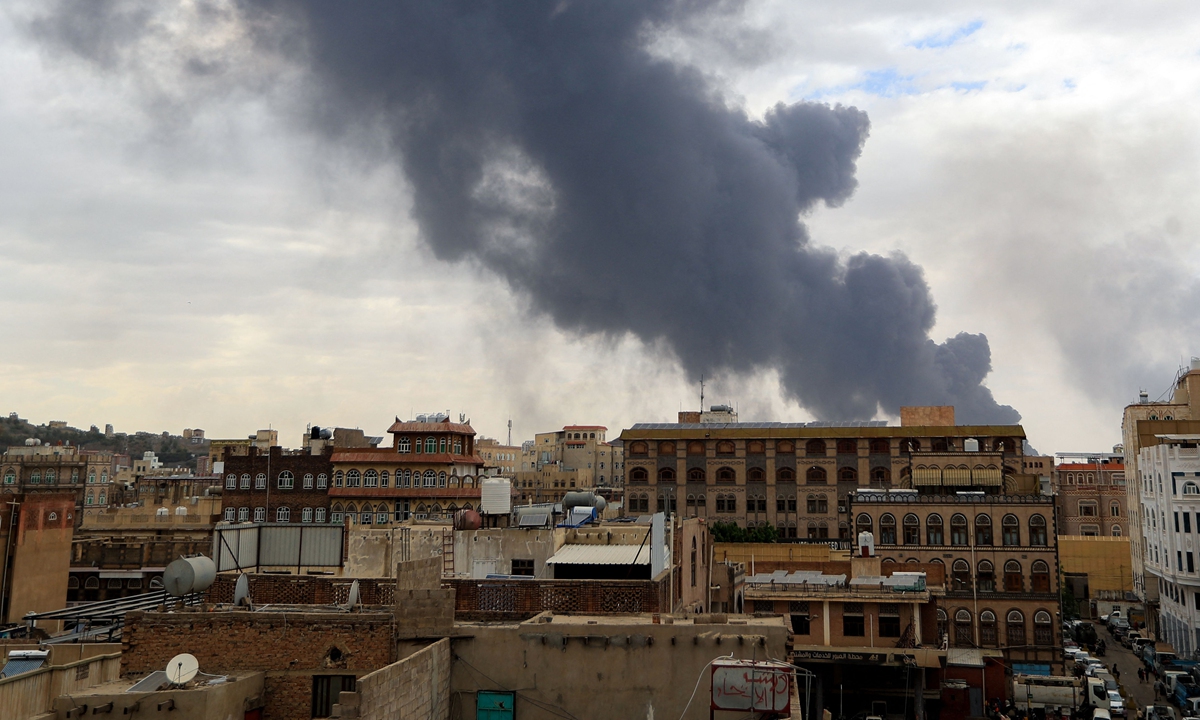Israeli airstrikes hit Yemen's Sanaa, Amran; more uncertainties in regional tensions: expert

Smoke billows following Israeli airstrikes targeting a power plant and Sanaa Airport, in Sanaa, Yemen, on May 6, 2025. Photo: VCG
Intensive airstrikes struck Yemen's capital Sanaa and the northern province of Amran on Tuesday afternoon, according to local residents. Israel later confirmed it carried out the strikes, stating they targeted infrastructure sites, including an airport and power stations, Xinhua News Agency reported on Tuesday.
Local witnesses reported thick black smoke rising over both Sanaa and Amran following the attacks. In Sanaa, the strikes hit Sanaa International Airport, the Dhahban power plant, and two military sites.
In Amran, about 60 km north of the capital, airstrikes reportedly targeted a concrete factory, said Xinhua.
At least four people were killed and 39 others injured in Israeli airstrikes on Yemen's Hodeidah province on Monday, health authorities run by the Houthi militant group said Tuesday in a statement, according to an earlier Xinhua report.
The Israeli airstrikes followed a Houthi missile attack on Sunday near Tel Aviv's Ben Gurion Airport, which resulted in eight injuries.
The Houthis said the missile attack was retaliation for Israel's military campaign in Gaza, while Israeli Prime Minister Benjamin Netanyahu vowed to retaliate against the Houthis and their ally Iran following the missile attack, per Xinhua.
Israeli Prime Minister Benjamin Netanyahu said on Monday an expanded offensive against Palestinian militant group Hamas would be "intensive" after his security cabinet approved plans that may include seizing the Gaza Strip and controlling aid, according to Reuters.
In response to a media inquiry regarding this issue, Chinese Foreign Ministry spokesperson Lin Jian stated at Tuesday's press briefing that China is closely watching the situation of the Palestinian-Israeli conflict. We oppose Israel's continued military operations in Gaza, and hope that parties will work to enable the continuous and effective implementation of the ceasefire agreement and return to the right track of political settlement, said Lin.
"Israel's plan is actually aimed at reconstructing the political and security landscape of Gaza, rather than simple conquest. Following the announcement of the plan, the Houthis in Yemen attacked Tel Aviv's Ben Gurion Airport to show solidarity with Palestine, forcing Israel to strike back against Yemen," said Wang Jin, an associate professor at the Institute of Middle Eastern Studies at Northwest University in Xi'an, with the Global Times.
Israel's high-profile announcement to expand military operation against Hamas is to apply extreme pressure to weaken Hamas' morale and defenses, and positioning Israel more favorably for future negotiations, Zhu Yongbiao, director of the Center for Afghanistan Studies at Lanzhou University, told the Global Times.
Zhu said that while there is a possibility of a deal being reached between Israel and Palestine, the biggest challenge lies in whether the agreement can be sustained in the long term, as there may be differences in how each side interprets it.
Although Israel's military actions are putting pressure on Hamas, they could also create more uncertainties, including extreme reactions, civilian casualties and a worsening humanitarian crisis. This adds complexity to the situation, and the likelihood of the agreement being reached and fully executed remains uncertain, Zhu added.



